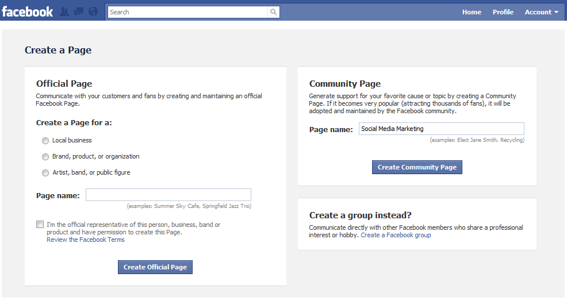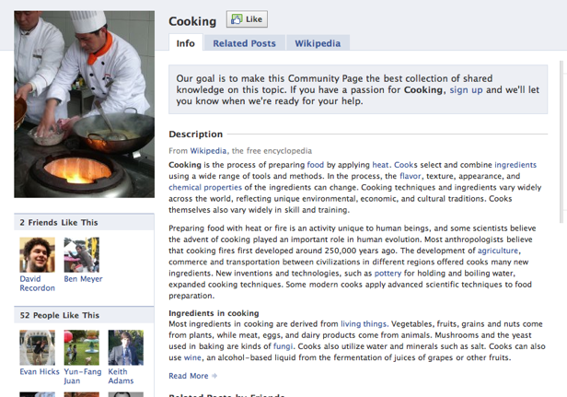Facebook Fan pages are changing. This is due to the Facebook’s desire to ensure that only individuals and organizations with official permission to do so create such pages. To replace those Fan pages created by, well, fans, Facebook has now introduced what it is referring to as Community pages.
“Community pages are a new type of Facebook Page dedicated to a topic or experience that is owned collectively by the community connected to it. Just like official pages for businesses, organizations and public figures, Community pages let you connect with others who share similar interests and experiences,” states a Facebook blog post on the topic.
Previously, when users went to Facebook to create a Fan page, they were presented only with that option. Now, they see this:

Screenshot of Facebook’s Create a Page.
Users have the option to create a Fan page, a Community page or a Group, as follows.
Fan Pages
Facebook’s intention is to segregate the creation of Fan pages only to those who have been officially designated by the subject of the page to do so. “You may only administer a Facebook Page if you are an authorized representative of the subject of the Page,” states Facebook’s terms of use. To further reinforce this change, Facebook has changed the terminology, as you can see above, and are calling them “Official” pages.
Community Pages
The newly created Community pages are intended to replace the plethora of “unofficial” pages that have been created by fans themselves. Instead of using the Fan page option, users are required to set up this new version.
The issue is to “keep official pages in the hands of their respective brand owners,” says Mashable, quoting a company spokesperson, while allowing users the opportunity to express their enthusiasm for the brand, person, company or band.
Perhaps the most interesting aspect of these new pages is that they will function very much like a wiki. Facebook indicates that Community pages are meant to be “the best collection of shared knowledge on a topic.”
Of the Community pages that have been created by Facebook, the content is primarily drawn from Wikipedia. “We’re starting by showing Wikipedia information, but we’re also looking for people who are passionate about any of these topics to sign up to contribute to the Page,” states the blog post regarding the subject.

Screenshot of a Community Page example.
Facebook Groups
Facebook Groups, a long-standing staple of the platform, continue to serve the same purpose, which is providing a place for Facebook members who share an interest or hobby to gather.
To put it succinctly, Fan pages are designed to be an official representation of its subject (company, personality, band), while Community pages are the “unofficial” user-created representation. As to Groups, think non-profit organizations, alumni associations and such.
Facebook sees this evolution as a natural progression in the growth of the platform:
“Facebook has always been about helping people make connections. We started with helping people connect with their friends, and over time we expanded this model to mirror more of the connections you make in your life—including organizations and interests that may not be people. We developed pages, for example, so you could connect to your favorite celebrities, musicians and businesses on Facebook.”
“Like” Terminology
Another recent change is the substitution of the term “Become a fan” with a button that reads, simply, “Like.” That, too, is the term being applied to the new Community pages.
Why This is Good for Businesses, But Not Necessarily Good for Business
I view this change as a double-edged sword. On the one hand, it makes Fan pages much more like “Brand” pages. It clarifies their purpose and limits their creation only to those who are officially designated to do so.
“Facebook wants to help brands establish a clearer presence on the site, as well as make things less confusing for users,” said Kevin Barenblat, CEO of social media marketing company Context Optional. It does seem this shift aligns itself well with that intention.
On the other hand, some of the best pages were those created by the fans themselves. Think of it, who would you rather have create a Fan page, a true, raving fan or a young intern in the company’s marketing department?
With its wiki-like focus on topics and areas of interest, it is conceivable that Community pages will cause fans to lose a bit of their evangelistic fervor. (With the wiki-style emphasis, they do appear a bit more sterile, even academic, than Fan pages.)
News of the introduction of Community pages is being met with mixed reviews. One blogger called the new feature “half baked,” while another said the changes will “help make official brand pages more distinct from third-party pages and groups.”
Does this also mean Facebook will repeal its use of “Fan” altogether in favor of the more ubiquitous “Like?” An email from Facebook to advertising agencies in late March advised them to use language such as “Find us on Facebook” and “Like us on Facebook” instead of “Become a fan.”
Conclusion
There are other changes that have been made or are soon-coming, such as connecting user profiles to pages. One thing is probable, as long as Facebook exists, it will institute changes with or without user consent or approval.





